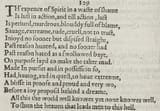Post your favourite Shakespeare sonnet. If you can't name that, then you don't belong on /lit/. For me it's sonnet 129:
Th' expense of spirit in a waste of shame
Is lust in action; and till action, lust
Is perjured, murd'rous, bloody, full of blame,
Savage, extreme, rude, cruel, not to trust,
Enjoyed no sooner but despisèd straight,
Past reason hunted; and, no sooner had
Past reason hated as a swallowed bait
On purpose laid to make the taker mad;
Mad in pursuit and in possession so,
Had, having, and in quest to have, extreme;
A bliss in proof and proved, a very woe;
Before, a joy proposed; behind, a dream.
All this the world well knows; yet none knows well
To shun the heaven that leads men to this hell.
>inb4 sonnets 18 or 29
Be more original.
>>24537087 (OP)please tell me good modern editions to read Shakespeare with some good introductory analysis
>>24537108You really don't need introductory analysis for Shakespeare. Since you can just go through each play under an hour while searching up any terms or lines you don't understand.

>>24537087 (OP)The changes in the modernisation of this poem actually do some damage (especially the punctuation): not only to the personal atmosphere of the poem but the meaning itself.
A semicolon after the first action instead of a comma gives a longer rest than Shakespeare gave; but it also cuts off the idea at action instead of keeping in action and till action together as well as the two lust's. A comma after bloody separates it from full with which it really forms a single word meaning 'full as with blood.' Next come several semicolons for commas; these introduce pauses which break up the continuous flow of ideas (if Shakespeare had wanted such pauses he would have used semicolons as he does elsewhere). In the original there is a full stop at mad, closing the octave; in the revised version a colon is used, making the next line run right on and causing the unpardonable change from Made to Mad. Made logically follows from make of the preceding line: ‘to make the taker mad, Made (mad)' but it also returns to the general idea of lust.
>>24537087 (OP)shakespeare is irrelevant these days
only historians and middle class white women who want to look intelligent care about him
unironically the average tiktok or insta creator is more relevant, linguistically speaking
The one that's like shall I compare thee to a summer's day
Bitches love that one
When to the sessions of sweet silent thought
I summon up remembrance of things past,
I sigh the lack of many a thing I sought,
And with old woes new wail my dear time’s waste:
Then can I drown an eye, unused to flow,
For precious friends hid in death’s dateless night,
And weep afresh love’s long since cancell’d woe,
And moan the expense of many a vanish’d sight:
Then can I grieve at grievances foregone,
And heavily from woe to woe tell o’er
The sad account of fore-bemoaned moan,
Which I new pay as if not paid before.
But if the while I think on thee, dear friend,
All losses are restored and sorrows end

